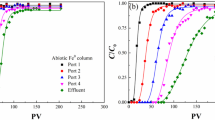Abstract.
Granular zero-valent iron was used for the treatment of groundwater pollution caused by chlorinated ethylenes, mainly TCE, cis-DCE and VC at an industrial site. The rapidly decreasing rates of de-chlorination in the initial phase were attributed to the precipitation of carbonates and the development of hydrogen by anaerobic corrosion. After 70 pore volumes, sulphate was reduced by bacteria. From this point in time, the degradation of TCE was slightly accelerated whereas the de-chlorination rates of the other chlorinated ethylenes decreased only slowly. This relative improvement was assumed to be caused by the uptake of electron-transfer-blocking hydrogen by bacteria. Because the overall trend of the degradation rates is negative we conclude that the inhibitive effect of carbonate precipitation and hydrogen formation cannot be compensated for by the positive influence of the activity of sulphate-reducing bacteria.
Similar content being viewed by others
Author information
Authors and Affiliations
Additional information
Electronic Publication
Rights and permissions
About this article
Cite this article
Köber, R., Schlicker, O., Ebert, M. et al. Degradation of chlorinated ethylenes by Fe0: inhibition processes and mineral precipitation. Env Geol 41, 644–652 (2002). https://doi.org/10.1007/s00254-001-0443-5
Received:
Accepted:
Issue Date:
DOI: https://doi.org/10.1007/s00254-001-0443-5



